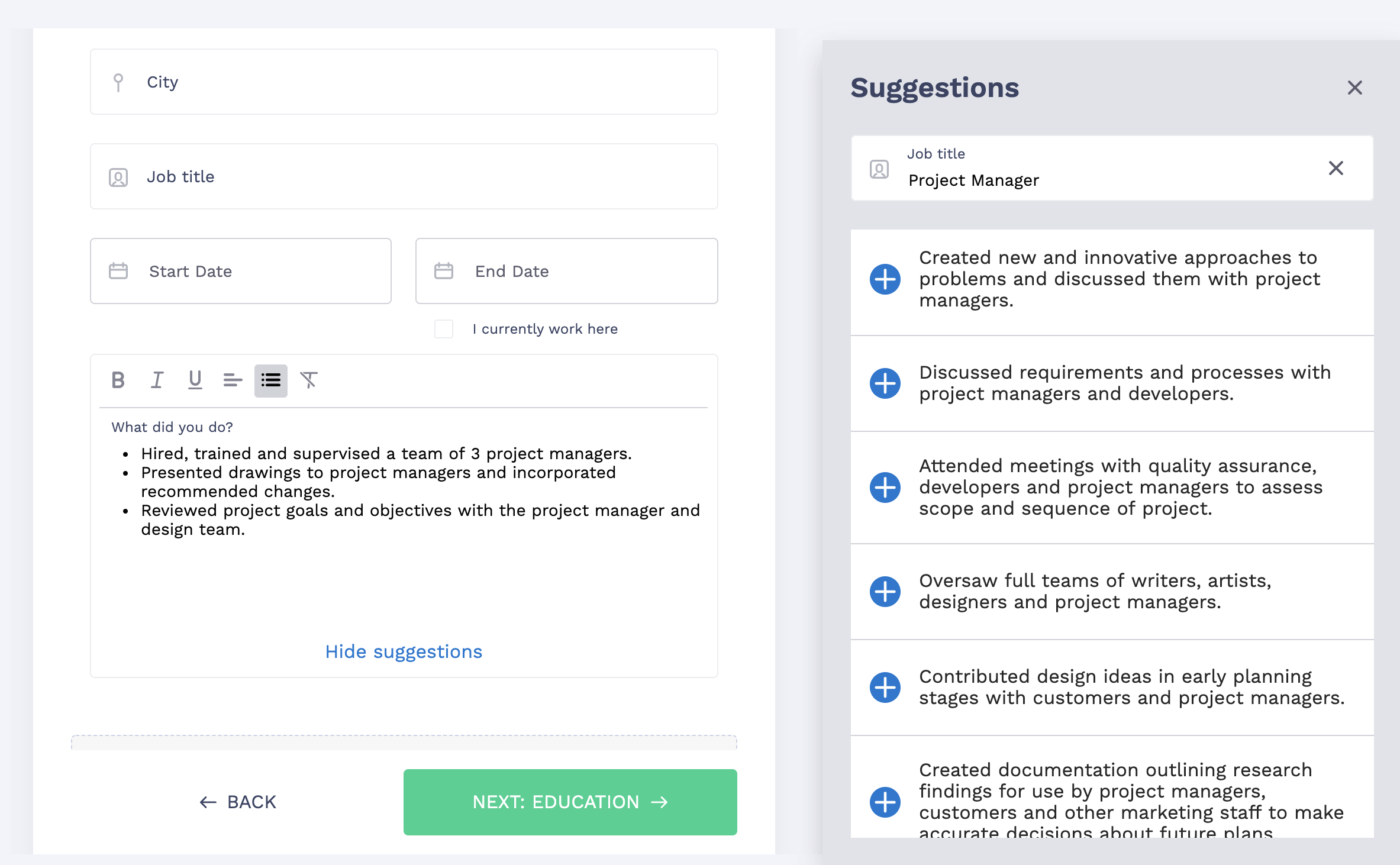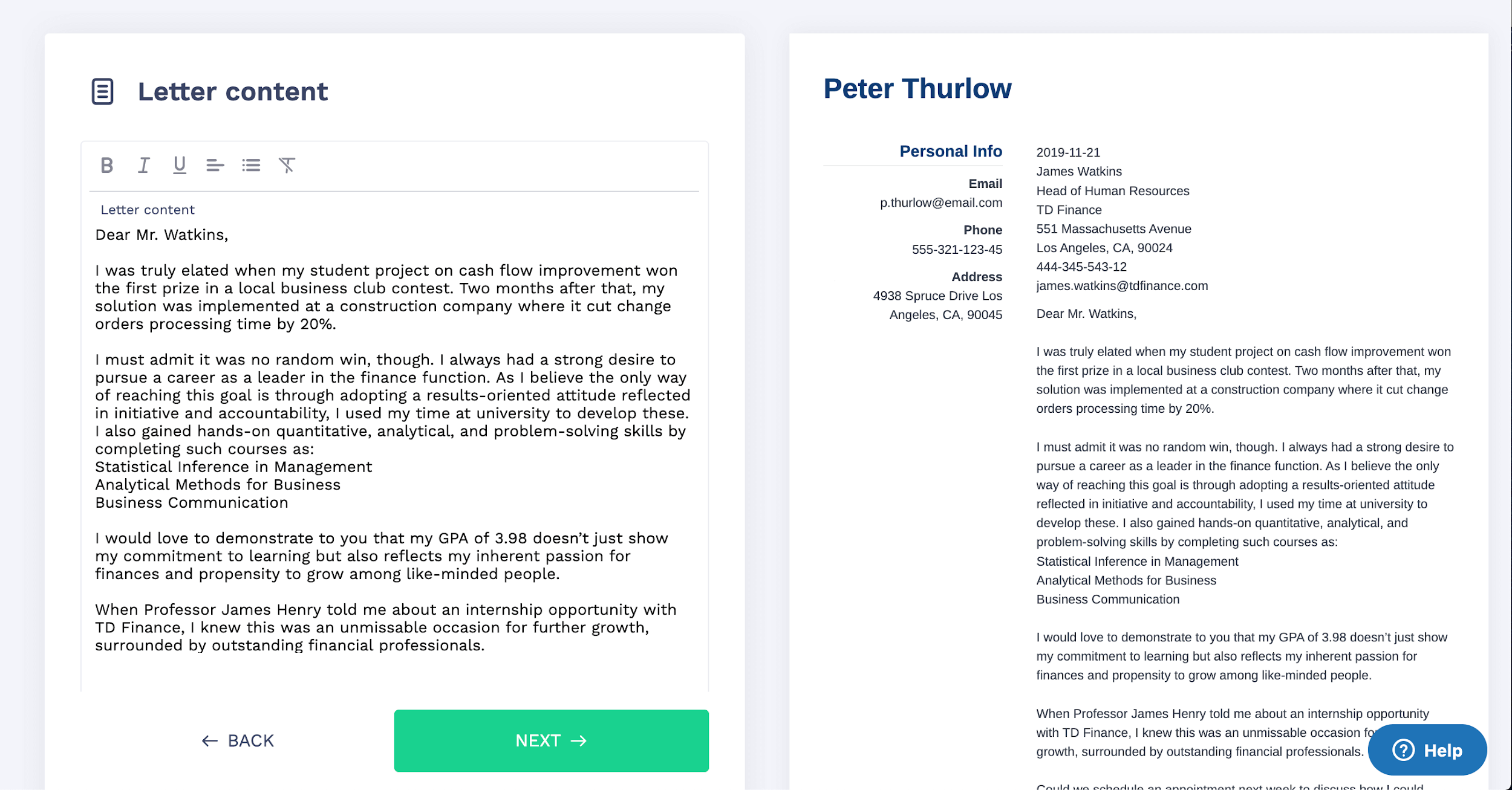
“Next,” said the recruiter putting another application into the trash. Then he grabs yours, you pass instantly. That's the power of the perfect headline for a resume!
Career Expert
You have probably heard the saying: “Don’t judge a book by its cover,” at least once. But, when browsing at a library or a bookstore, what is it that determines whether you pick up the book to at least read the abstract? The cover and title.
A resume headline acts as a “title” to the “cover” of your resume template, making the recruiter want to read your application further.
In this guide, you’ll see:
Save hours of work and get a job-winning resume like this. Try our resume builder with 20+ resume templates and create your resume now.

What users say about ResumeLab:
I had an interview yesterday and the first thing they said on the phone was: “Wow! I love your resume.”
Patrick
I love the variety of templates. Good job guys, keep up the good work!
Dylan
My previous resume was really weak and I used to spend hours adjusting it in Word. Now, I can introduce any changes within minutes. Absolutely wonderful!
George
Looking for more tips on creating an effective resume? Check out these articles:
A , also called a resume title, is a single sentence at the top of a resume to catch the reader’s attention. It introduces a potential employer to your work experience, skill set, and professional achievements. Resume headlines use relevant keywords to beat Applicant Tracking Systems.
Although they sound similar, they’re two different parts of a resume. A resume header carries basic contact information like your name, phone number, and email address. Meanwhile, a resume headline is a one-sentence introduction statement to your job application.
You should absolutely write both! Win the recruiter’s attention through your powerful resume headline, and they’ll gladly read your resume summary or resume objective. If you provide the answer to why you’re the best candidate for this position in just the headline, your chances of landing an interview will increase dramatically.
Now that you know what a resume title is, let’s look at these excellent resume headline examples for multiple jobs. Use them as inspiration when creating your own catchy headline.
These examples show exactly how to make an impact on the recruiter with a good headline for a resume. Now, let’s delve into how to write a great resume title for your own job application.
A good resume headline is concise and attention-grabbing. It should briefly summarize your skills and experience and must be relevant to the job you’re applying for. Make your headline unique so that you stand out from the crowd.
Here are ten best practices for writing an effective headline for your resume:
Expert Hint: Don’t write just one resume headline. Create a couple of them for every job you want to apply for. You need to tailor your job application for it to be successful.
The ResumeLab builder is more than looks. Get specific content to boost your chances of getting the job. Add job descriptions, bullet points, and skills. Easy. Improve your resume in our resume builder now.

Nail it all with a splash of color, choose a clean font, and highlight your skills in just a few clicks. You're the perfect candidate, and we'll prove it. Use our resume builder now.
You can’t guarantee the recruiter will look at your application after they have their coffee. And this is why you need a resume title—it acts as a lighthouse guiding recruiter’s eyes, no matter how tired they might be. Not fully convinced? Take a look at why a headline for a resume can help you in your job-hunting efforts:
Once you read the job ad, you know what the company expects from an applicant. And if you boil it down to just one sentence, that’s the headline for the resume.
You may not be aware of it, but some companies use automated applicant tracking systems. And if you’ve ever been rejected for a job you would’ve been an excellent fit for, chances are your resume wasn’t even checked by a human.
The software scans your resume for specific resume keywords and other things your future employer wants to see. Usually, they’re specific skills or years of experience. When you put this information on top of your resume, right in the headline, the software will scan it and let you pass.
It doesn’t matter if you’ve been working for 7+ years and boast a two-page resume filled to the brim with impressive achievements or if you’re a recent graduate who can fit their resume on one page. A resume headline can help you in both cases.
Experienced workers often run into the problem of not knowing which of their key resume accomplishments to highlight. If you’re one such employee, you definitely know that feeling. And if you put a whole page of achievements on your resume, recruiters can feel overwhelmed. A resume title anchors your key accomplishments to a specific achievement you chose to represent your expertise.
Meanwhile, a headline on an entry-level resume can perfectly complement it. Job ads often have expected skills and toolsets sprinkled throughout them. Show them in your resume headline for maximum impact.
A resume headline doesn’t let you drown in the sea of other applications. Since most applicants don’t even include one, your resume will stand out immediately. And when you tailor your resume correctly, it becomes a selling point no recruiter can glance over and disregard.
Expert Hint: Focus on a specific expertise or proficiency of yours. Try to imagine writing an answer to the question, “Who are you, and what do you do best?”
Double your impact with a matching resume and cover letter combo. Use our cover letter generator and make your application documents pop out.

Want to try a different look? There's 21 more. A single click will give your document a total makeover. Pick a cover letter template here.
To create a perfect resume title that enhances your application, remember to:
Got questions on how to write a stunning resume headline? Which achievement should you include in your resume title? Leave a comment. We’ll be happy to reply.
At ResumeLab, quality is at the crux of our values, supporting our commitment to delivering top-notch career resources. The editorial team of career experts carefully reviews every article in accordance with editorial guidelines, ensuring the high quality and reliability of our content. We actively conduct original research, shedding light on the job market's intricacies and earning recognition from numerous influential news outlets. Our dedication to delivering expert career advice attracts millions of readers to our blog each year.
Written by Mariusz WawrzyniakMariusz is a career expert with a background in quality control & economics. With work experience in FinTech and a passion for self-development, Mariusz brings a unique perspective to his role. He’s dedicated to providing the most effective advice on resume and cover letter writing techniques to help his readers secure the jobs of their dreams.

How to put volunteer experience on resumes. When to add volunteer resume work to work experience. How to list volunteer work on a resume to make employers notice.

Learn how to email a resume the right way and start getting more job offers. See a proven resume email sample and learn how to write one yourself.
Michael Tomaszewski, CPRW
Certified Professional Resume Writer, Career Expert

What should be the margins on a resume? How to set them right? Well, you don’t have to worry anymore. We’ve got your answers & some cool text alignment tips.
Maciej Duszynski, CPRW
Certified Professional Resume Writer, Career Expert
* The names and logos of the companies referred to above are all trademarks of their respective holders. Unless specifically stated otherwise, such references are not intended to imply any affiliation or association with ResumeLab
Choose a region
© 2024 Labs Limited. All rights reserved.